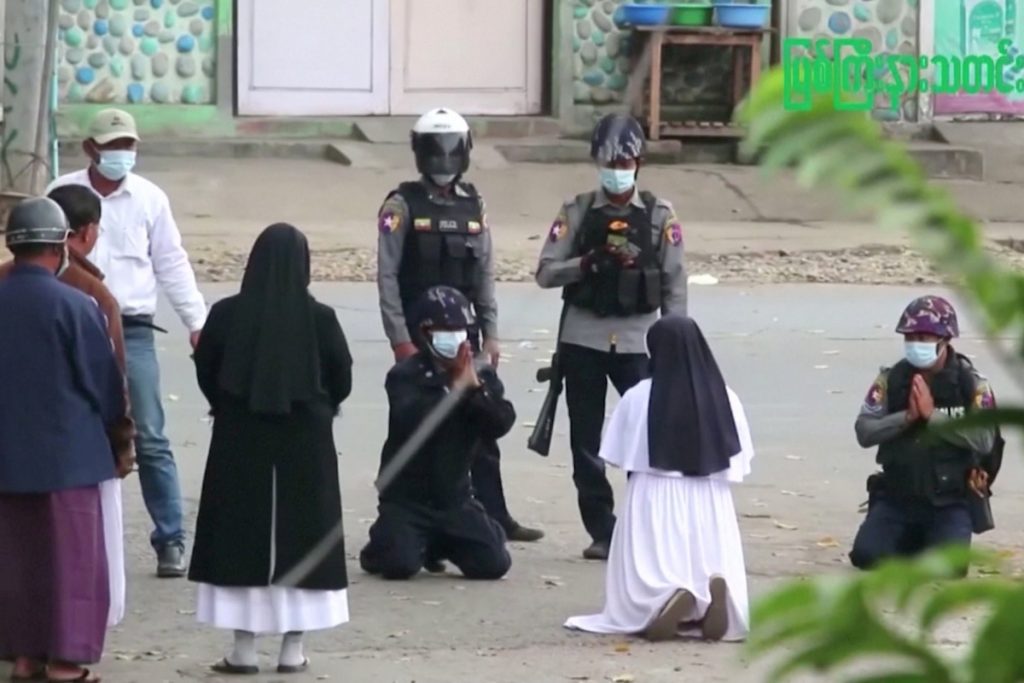Peace and Joy of Jesus, the Lord who has the words of eternal life. May His consoling words echo in our hearts, in our mutual support, in every corner of this nation, waiting for life to emerge. Let his eternal words, heal and console every wounded soul in this nation. We continue to pray, that the Good Shepherd accompanies us during these days of great challenges.
We are thankful that the severity of the COVID spread is very slowly reducing. But there is no time for lowering the guards. We need to stand together because we face so many evil forces at the same time.
We are grateful once again to the greatest humanitarian witness of our health professionals, frontline workers, volunteers in the care centers. Once again, Myanmar people have proved themselves to be the greatest witness to their generous giving, so many people reaching out to the affected people, many businessmen setting up care centers. God will reward them hundredfold.
We remember with a very heavy heart, nearly 13,000 of our country men and women who perished to this virus – among them more than 100 writers, artists, and other creative persons. Our country is poorer because of their untimely death. We also support the families of nearly 360,000 people infected and struggling with their lives. We pray to God that this pandemic may die out and our people can come out of the multiple challenges. We pray on our knees: Give us Lord healing.
We turn to today’s readings. The central theme is: God never abandons us. Do we show faith in God? The answer to this question is very difficult, especially in today’s Myanmar. Not many signs in the last seven months. When challenges come, do we lose faith in God?
That is the question Joshua faces in the first reading: Joshua, the leader of the Israelite tribes after the death of Moses, conquered Canaan and distributed its lands to the 12 tribes. He expected people’s gratitude to God.
Joshua is confronted with the crowd, which at the slight temptation, was ready to worship any idols and not the true God. Moses faced the same challenge. Despite all the miracles Yahweh worked for the people, they worshipped an idol: the golden calf.
Yahweh of the Old Testament chose a race, the Israelites, who will live for an ideal, not an Idol. The Bible castigates domesticating God’s message by the people. God demands ethical life, a life of concern for others, especially the widows and orphans. Every human being made in God’s image, to be respected. That is the ideal they were called for. But the lazy population chose not to live, but to worship death through worship of idols. The conflict is ideal against and idols. The ideal challenges and forces selfish human beings into other centered, concerned about others, caring for the common good, the greater good for the greater number of people.
This radical demand of the Bible has been diluted in the history by those who are called to be the chosen race. Idol worship is easier. Idol gives a compromised compromise without any commitment.
We have great experience of this idolatry in our country.

This nation was born with the great dream of peace and prosperity for all. That was the ideal. Yet powerful people diluted this ideal. Created their own idols: Power, possessions, extreme wealth at any cost, economic injustice, environmental injustice. So many idols in Myanmar. Idolatry has overtaken the great ideals of Metta and karuna. For the last seven decades these idol worshippers have robbed the ideal of a nation built on peace and prosperity for all. A dream became a nightmare.
The nation faces the same challenge as Joshua faced: Can this nation get out of idolatry of power, prestige and unjust wealth? The people promised Joshua: We will, and serve the Lord.
The Old Testament strongly believed all power to Government comes from God. The prophet Isaiah says:
For a child will be born to us, a son will be given to us; and the government will rest on His shoulders; and His name will be called Wonderful Counselor, Mighty God, Eternal Father, Prince of Peace. (Is 9:6)
But what is that government for: According to the Bible every government is for service.
“Although He existed in the form of God, did not regard equality with God a thing to be grasped, but emptied Himself, taking the form of a bond-servant, and being made in the likeness of men” (Philippians 2:6-7).
Every government that does not get its legitimacy from service to the people, has not drawn it legitimacy from God. The whole exercise is an exercise in idolatry, condemned by the Bible. Real power, as Pope Francis often cited, comes from service. Not imposing power on the innocents.
What does a government that derives legitimacy from service look like? St Paul gives a candid answer in the second reading, through is letter to the Ephesians. The government and the people are like a family. It is not hierarchy. That relationship is shown in a very energizing example. The family has the same love linkage and bondage as Jesus has for the Church. A good marriage, according to St Paul, is loving union. He quotes the Genesis impressing that in marriage, there are not two people, they are one, like two eyes and one vision.

That is a great metaphor. For any government, in any just country, the government is not above the people. The government is one of the eyes, the people the other eye. Two eyes and one vision. A nation built on justice. Anything else is idolatry. Israel fell into darkness because of idolatry.
The Gospel picks up the story of Joshua. Before Moses died, he appointed Joshua as his successor. Joshua became a prophet in his own right and led the Israelites victoriously into Canaan. The same crisis of confidence which Jesus faced is faced by Joshua. Sensing that he is soon to die, Joshua summons a plenary assembly of Israel for a solemn act of recommitment to the covenant.
Joshua was troubled. The Jews have a land and starting living among other people. Will they be faithful to Yahweh or will they fall victims to false Gods and enter into idol worship? Confronted with the choice of going over to the gods of other nations or serving the Lord, the people renew their allegiance, “We too will serve the Lord.”
A similar conflict is brewing in the Gospel. We have been dealing with “bread narratives” of Jesus in the last three weeks: Jesus feeding the starving multitudes, his discourse on the heavenly manna, and “I am the living bread that came from heaven.” Jesus preaches a living God and his Word that became flesh and dwelt among us. Will his disciples, and we can follow this ‘Living bread’?
Here is the challenge: Each of us is born with a selfish nature — a self-will. Selfish men, egoistic men bring disaster on themselves and on others. We have seen this happening to all of us.

The psalmist prays :
Create in me a clean heart, O God, and renew a right spirit within me ( Psalm : 51:10)
Many spiritually-minded people either claim or desire to have a pure heart. But this can only take place when the Creator of our hearts is allowed to work in us. Rather, when we allow the Lord to work our innate rebellion — our selfish nature — out of us.
How does God purify a person’s heart? He uses external pressure. That demands first we become aware of our selfishness. Purify our selfishness through the “word that is the ‘bread from heaven.”
Life is full of tests. It’s the tests of life that bring our selfish nature to the surface. Just as in purifying a precious metal like silver or gold in a furnace with intense heat that reduces the metal to a liquid, so God uses various tests in our life to reduce and refine us.
God refines us so His image is reflected in us
The crucible is for refining silver and the smelter for gold, but the one who purifies hearts by fire is the Lord. (Proverbs 17:3)
Jesus throws a challenge. He is the “Bread that came from Heaven.” He is not the God who met Moses on the Mountain. He is the God who comes down, descends to human level. Will you follow him? Become a disciple? Or a devotee, making him another idol? Not an ideal.
Some of the disciples, it seems, would feel more comfortable if they had been given a set of precepts to live by, such as the Law brought down from Sinai by Moses. God would remain in heaven and they would keep the laws and all would be well; they could be comfortable with this notion of God.
This discourse follows the miracle in which Jesus fed more than five thousand people with five barley loaves and two fish. As Jesus has been teaching these things, John’s Gospel describes a murmuring crowd unable to accept Jesus’ words. The number of people following Jesus dwindled from a crowd of more than 5,000 to only 12 people. And it is to these Twelve that Jesus now turns his attention. Will the go away because the ‘perishing bread’ is challenged by “Bread from heaven?”
Same temptations we face. As so many difficulties. We are looking for a Jesus, to be just an idol. As he challenges us to live up to his ideal, of love of neighbor, concern for the weak and the vulnerable, our temptation is to make him just a ‘bread’ to quench our anxieties.
What are the difficulties of the last seven months and beyond tell us? Murmuring against God, temptation to leave, or to learn to believe in the “bread from heaven” or as St Peter professed: “where shall we go Lord, you have the Words of eternal life?”
Not easy to answer.
We have seen the selfish interests of a few, seeking the “bread that perishes” has robbed millions of their bread of peace, their bread of life, their bread of prosperity. So many deaths, so much of brokenness, so much of human agony. So much of unceasing tears. All because a handful of men chose to rob our people of their “the bread from heaven” – God’s providential care for his children. Sorrow.
Yet this is not the time to lose our humanity, but to affirm our humanity, understanding through all the tests to discern what is ideal and what is idol. Our pilgrimage to human dignity is a long march and that could be only sustained through “the Words of Eternal life – the bread that came from heaven.” We shall not be shaken in our faith. God’s time is not our time. He comes at the hour when only best happens to the good people.
Till that time, let us console one another with the words of Jesus: Fear Not I am with you always. Let every word of us, become the ‘Bread that comes from heaven.”
Homily of Cardinal Charles Maung Bo for the 21st Sunday of the Ordinary Time






